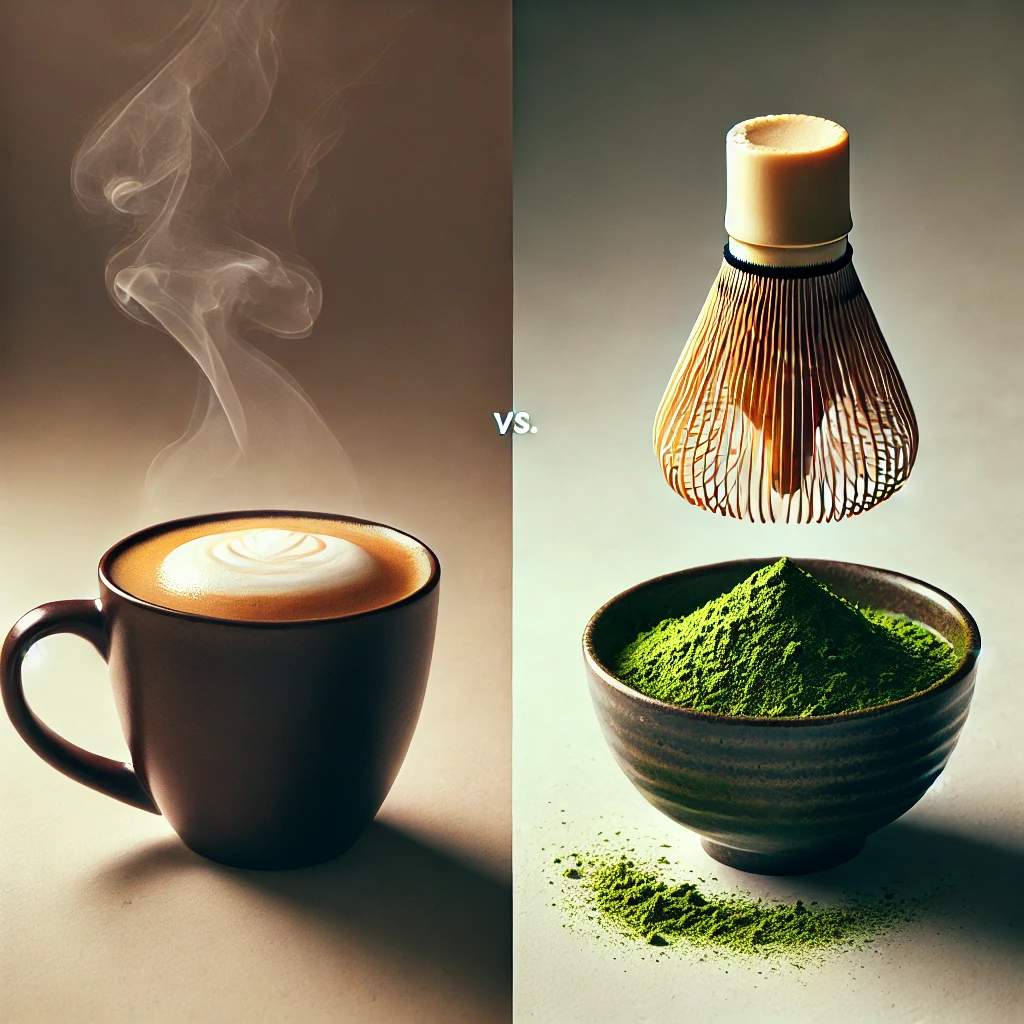Coffee has been a staple morning drink for many, giving people a quick energy boost to start their day. However, in recent years, matcha, a finely ground green tea powder from Japan, has gained immense popularity as a potential healthier alternative. This article aims to explore whether matcha is truly better than coffee by comparing their health benefits, caffeine content, taste, and more. If you’ve been wondering which drink suits your lifestyle better, keep reading to find out!
What is Matcha?
Matcha is a type of powdered green tea that originates from Japan, traditionally used in Japanese tea ceremonies for centuries. Unlike regular green tea, where leaves are steeped and then discarded, matcha involves consuming the entire leaf in powdered form, resulting in a more potent beverage.
How Matcha is Made:
The process begins by growing shaded green tea plants, which boosts their chlorophyll content and enhances the amino acid levels. Once the leaves are harvested, they are steamed, dried, and stone-ground into a fine powder. This method ensures that matcha retains all the nutrients from the tea leaves, including antioxidants, L-theanine, and caffeine.
Nutrient Profile:
Matcha is packed with antioxidants, particularly EGCG (epigallocatechin gallate), which has been linked to numerous health benefits, including cancer prevention and improved heart health. Additionally, matcha contains L-theanine, an amino acid known for promoting relaxation without drowsiness, making it a unique drink for mental clarity and calm focus.
What is Coffee?
Coffee has a long and storied history dating back to the 15th century in Ethiopia. Over time, it has become one of the world’s most consumed beverages, with various brewing methods and styles catering to different preferences. Coffee is made from roasted coffee beans, which are typically brewed into a rich, aromatic beverage.
Coffee Types and Varieties:
There are many ways to prepare coffee, from espresso shots to drip coffee and cold brew. Each method can affect the flavor and caffeine content of the final cup. Coffee is well-known for its strong, sometimes bitter flavor, making it a go-to option for people who prefer a bold taste.
Nutrient Profile:
Coffee is a good source of caffeine, which stimulates the central nervous system and provides an immediate energy boost. It also contains antioxidants, such as chlorogenic acids, which are believed to have anti-inflammatory and heart health benefits. However, coffee’s high acidity can sometimes lead to digestive discomfort in certain individuals.
Health Benefits: Matcha vs. Coffee
When comparing the health benefits of matcha and coffee, it’s essential to look at their unique compounds and how they affect the body.
Antioxidant Power:
- Matcha: One of matcha’s standout benefits is its rich antioxidant content. The EGCG found in matcha has been linked to lowering risks of chronic diseases such as heart disease and cancer. According to a 2018 study, matcha contains 137 times more antioxidants than regular green tea, making it a powerful tool for boosting overall health.
- Coffee: Coffee is also rich in antioxidants, particularly chlorogenic acids, which can help reduce inflammation and support heart health. Studies have shown that moderate coffee consumption can lower the risk of developing type 2 diabetes and certain types of cancer, like liver cancer.
Mental Clarity and Focus:
- Matcha: Thanks to its L-theanine content, matcha provides a calm, focused energy that can last for hours. L-theanine promotes the production of alpha waves in the brain, leading to a state of relaxed alertness, perfect for mental tasks that require focus without the jitters.
- Coffee: Coffee’s caffeine offers a more immediate and sharper energy boost, making it ideal for short bursts of mental clarity. However, the quick spike in energy is often followed by a crash, which can leave people feeling fatigued later in the day.
Health Benefits: Matcha vs. Coffee (Continued)
Impact on Heart Health:
- Matcha: Studies have shown that matcha can help lower LDL cholesterol (often referred to as “bad” cholesterol) and triglycerides, contributing to better heart health. A 2019 study in the Journal of Nutritional Biochemistry found that the consumption of green tea, including matcha, can improve heart health by reducing oxidative stress and inflammation, two key factors in the development of heart disease.
- Coffee: Coffee, when consumed in moderation, can also support heart health. According to a 2020 review in the American Journal of Clinical Nutrition, regular coffee drinkers had a 5% to 15% reduced risk of heart disease. However, excessive consumption may raise blood pressure and contribute to cardiovascular issues in some individuals, especially those sensitive to caffeine.
Weight Loss and Metabolism:
- Matcha: Matcha is known to help with fat oxidation, particularly during exercise. A 2018 study found that consuming matcha before physical activity increased fat burning by 25%, making it a great addition to a weight loss regimen. The combination of caffeine and EGCG helps enhance metabolism and encourage weight loss without the spike-and-crash effects often associated with other stimulants.
- Coffee: Coffee is a well-known metabolism booster, primarily due to its caffeine content. Caffeine increases thermogenesis, which helps your body burn calories. However, the effects are generally short-lived compared to matcha. While coffee can assist with weight loss, many people add sugar and cream, which may counteract its benefits.
Calmness vs. Jitters:
- Matcha: One of the main reasons people are switching to matcha from coffee is to avoid the jitters that often accompany coffee’s high caffeine content. Thanks to L-theanine, matcha provides a more balanced, sustained energy boost. This amino acid moderates the effects of caffeine, helping to improve focus and relaxation without causing anxiety or an energy crash.
- Coffee: Coffee delivers a stronger, quicker burst of energy but often comes with side effects such as nervousness, restlessness, and jitters. This is especially true for individuals who are sensitive to caffeine or drink several cups throughout the day. While some people enjoy the immediate rush coffee provides, others prefer matcha for its smoother, more controlled energy.
Caffeine Content: Which Gives a Better Boost?
One of the primary reasons people turn to both coffee and matcha is for their caffeine content and energy-boosting properties. However, the way these two beverages deliver caffeine differs significantly.
Caffeine Levels:
- Matcha: A standard serving (1 teaspoon or 2 grams) of matcha contains roughly 35 to 70 mg of caffeine, depending on the quality of the matcha powder and the serving size. While this is lower than a typical cup of coffee, matcha’s caffeine is absorbed more slowly, providing a steady energy boost that can last several hours.
- Coffee: A typical 8-ounce cup of brewed coffee contains about 95 mg of caffeine. Espresso shots contain even more, with some single servings reaching 63 mg of caffeine. Coffee provides an almost immediate caffeine hit, which is great for a quick energy fix but may result in an energy crash later on.
Energy Peaks and Crashes:
- Matcha: Due to the presence of L-theanine, matcha’s caffeine is released gradually, providing long-lasting energy without the sharp spike and subsequent crash associated with coffee. This makes matcha an ideal drink for people who need sustained mental clarity throughout the day.
- Coffee: While coffee provides a faster and more intense energy boost, it often leads to energy crashes a few hours later, especially when consumed on an empty stomach. This is because coffee stimulates a quick release of adrenaline, which eventually wears off, leaving many feeling fatigued.
Taste and Experience: Which Suits Your Palate?
The flavor profiles of matcha and coffee are drastically different, and personal preference plays a huge role in determining which drink people prefer.
Matcha’s Flavor Profile:
- Matcha has a distinct earthy taste with a subtle sweetness that some describe as grassy or vegetal. For those new to matcha, the taste can be an acquired one, but it’s versatile and can be blended into lattes, smoothies, or enjoyed as a simple tea. The quality of the matcha powder can greatly affect its taste, with higher-quality matcha being smoother and more flavorful.
- Matcha is often served with milk (as a latte), honey, or even vanilla to make it more palatable to newcomers. There are also endless ways to enjoy matcha, from iced matcha lattes to incorporating it into recipes like pancakes or desserts.
Coffee’s Flavor Profile:
- Coffee, on the other hand, is known for its bold, bitter flavor. This strong taste is appealing to people who enjoy dark, roasted flavors. Depending on the roast, coffee can range from sweet and mild (light roast) to dark and intensely bitter (dark roast).
- Coffee also allows for a wide variety of preparations. Whether you prefer a simple black coffee, a frothy cappuccino, or a cold brew with a splash of milk, coffee’s versatility ensures there’s something for everyone. However, people who dislike bitterness may need to add sugar, milk, or syrups, which can increase the calorie count of their drink.
Impact on Digestive Health
Digestive health can play a significant role in deciding whether matcha or coffee is the better choice for an individual. While both drinks offer health benefits, their effects on digestion can vary greatly.
Matcha’s Gentle Impact:
- Low Acidity: Matcha is low in acidity, making it a gentle option for people with sensitive stomachs or those prone to acid reflux. Its high chlorophyll content helps neutralize acidic substances in the body, promoting better digestive health overall.
- Supports Detoxification: Matcha also contains natural detoxifying agents like chlorophyll, which may help the body eliminate toxins. This is a bonus for those seeking a cleansing drink that doesn’t irritate their stomach lining.
Coffee’s Potential for Acid Reflux:
- High Acidity: Coffee is much more acidic than matcha, with a pH level around 4.85 to 5.10, compared to matcha’s pH level of around 9. The high acidity of coffee can lead to acid reflux, heartburn, or indigestion in some people, particularly if consumed on an empty stomach. For people prone to gastrointestinal issues, this can make coffee a less favorable option.
- Diuretic Effect: Coffee’s diuretic properties may lead to increased urination and potential dehydration, which can irritate the digestive system if not balanced with adequate water intake.
Sustainability and Ethical Considerations
As consumers become more conscious of their environmental impact, sustainability plays an increasingly important role in the decision between matcha and coffee. Both drinks have a global production footprint, but their environmental impacts and ethical sourcing practices differ.
Environmental Impact of Matcha:
- Sustainable Farming Practices: Matcha production, particularly high-quality ceremonial-grade matcha, is typically grown in small, family-owned farms in Japan. These farms often prioritize sustainable and traditional farming methods, minimizing the use of pesticides and fertilizers.
- Lower Carbon Footprint: Since matcha involves consuming the entire leaf, there is little waste generated in the production process. However, matcha is grown in specific regions, meaning that its transportation contributes to its carbon footprint, especially if imported to distant countries.
Environmental Impact of Coffee:
- Deforestation Concerns: Coffee production, especially in large-scale commercial farms, is often linked to deforestation, particularly in tropical regions like South America and Africa. The demand for coffee has led to vast areas of rainforest being cleared for coffee plantations, which disrupts local ecosystems and biodiversity.
- Fair Trade and Ethical Sourcing: However, many coffee companies are now working towards more sustainable and ethically sourced practices, including Fair Trade certifications and shade-grown coffee, which helps protect rainforests. Consumers can support environmentally friendly coffee options by choosing organic and fair-trade certified products.
Price Comparison: Affordability of Matcha vs. Coffee
For many consumers, the price of their favorite beverage plays a key role in deciding whether to choose matcha or coffee on a daily basis.
Cost of Matcha:
- Higher Price: Matcha is generally more expensive than coffee, particularly for high-quality, ceremonial-grade matcha. A 30-gram tin of ceremonial matcha can cost anywhere from $20 to $30 or more, depending on the brand and grade. This translates to about $1 to $2 per serving, making it a luxury for regular consumption.
- Value for Money: While the price may be higher, the nutritional value and sustained energy provided by matcha could justify the cost for those looking for a long-term investment in their health.
Cost of Coffee:
- Affordable Daily Option: Coffee, on the other hand, is more widely available and tends to be much more affordable. A standard bag of ground coffee or beans can range from $5 to $15, providing dozens of servings. A typical cup of home-brewed coffee costs significantly less than a serving of matcha.
- Specialty Coffees: While regular coffee is affordable, specialty coffee drinks like lattes, cold brews, or cappuccinos from cafes can add up quickly, sometimes costing as much as $4 to $6 per drink, putting them closer in price to matcha lattes.
Matcha as an Alternative to Coffee
For those considering switching from coffee to matcha, it’s important to understand what to expect in terms of energy levels, taste, and potential health benefits.
Switching to Matcha: What to Expect:
- Smoother Energy Transition: Many people who switch to matcha report a more balanced and sustained energy throughout the day. Since matcha contains less caffeine than coffee but is absorbed slowly, it eliminates the sharp spikes and crashes associated with coffee. This can be particularly beneficial for individuals who are sensitive to caffeine but still need a pick-me-up.
- Taste Adjustment: If you’re used to the bold, bitter taste of coffee, matcha may take some time to get used to. Its earthy and grassy flavors are quite different, but with the addition of milk or a sweetener, many people come to love it over time.
Combining Both:
- Best of Both Worlds: Some individuals prefer not to completely give up coffee and instead incorporate matcha into their routine alongside coffee. For example, they may have coffee in the morning for an immediate energy boost and enjoy matcha in the afternoon to maintain a calm focus.
Final Verdict: Is Matcha Better Than Coffee?
After evaluating the health benefits, caffeine content, taste, environmental impact, and cost, it’s clear that both matcha and coffee have their unique advantages and drawbacks. Ultimately, whether matcha is better than coffee depends on your individual preferences and health goals.
When Matcha Might Be the Better Choice:
- Calm, Focused Energy: If you’re looking for a gentler energy boost that avoids jitters and energy crashes, matcha might be a better fit for you. Thanks to its L-theanine content, matcha provides a smooth and sustained level of alertness, making it ideal for people who need long-lasting focus without the sharp peaks and troughs of caffeine highs.
- Antioxidant-Rich for Health-Conscious Individuals: Matcha’s high levels of antioxidants, particularly EGCG, make it a superior choice for those interested in the long-term health benefits of fighting inflammation, protecting against chronic diseases, and supporting heart health.
- Sensitive Digestive Systems: For individuals who experience acid reflux, heartburn, or other digestive issues when drinking coffee, matcha offers a low-acid alternative that is much gentler on the stomach.
When Coffee Might Be the Better Choice:
- Quick, Strong Energy Boost: Coffee provides a faster and more intense boost of energy, which may be better for people who need an immediate pick-me-up. Whether it’s an early morning or a late-night work session, coffee’s high caffeine content delivers a powerful and quick surge of energy.
- Bold Flavor Lovers: If you love the rich, robust flavors of coffee and enjoy the ritual of brewing or visiting a café for specialty drinks, coffee might remain your preferred choice. There’s also more variety in coffee brewing methods, allowing you to experiment with different tastes and textures.
- Affordability and Accessibility: Coffee is more affordable for everyday consumption, especially if you’re drinking it at home. It’s also widely available and comes in many convenient forms, from instant coffee to pods and freshly brewed cups.
FAQ Section
- Does matcha have more caffeine than coffee?
- No, matcha generally contains less caffeine than coffee. A typical serving of matcha has about 35 to 70 mg of caffeine, while an 8-ounce cup of coffee contains about 95 mg.
- Can I drink matcha every day?
- Yes, drinking matcha daily is safe and can be beneficial due to its high antioxidant content and calming effects from L-theanine. However, like any caffeinated beverage, it’s important to consume it in moderation.
- Does matcha or coffee stain teeth more?
- Both matcha and coffee can stain teeth, but coffee is more notorious for causing yellowing due to its dark color and acidity. Matcha, being a lighter and less acidic drink, tends to cause fewer stains, although long-term consumption can still lead to some discoloration.
- Is matcha better for anxiety than coffee?
- Yes, for individuals prone to anxiety, matcha may be a better option. The L-theanine in matcha helps promote relaxation and reduces the risk of caffeine-induced jitters or anxiety, which are common side effects of drinking coffee.
Conclusion
In the end, whether matcha is better than coffee comes down to personal needs and preferences. Matcha shines when it comes to delivering calm, focused energy and providing long-term health benefits thanks to its antioxidant properties. Coffee, on the other hand, is a powerful choice for those who need a quick, intense energy boost and love the ritual of brewing or drinking a strong, aromatic cup.
Instead of choosing one over the other, why not incorporate both into your daily routine? Enjoy a cup of coffee to kickstart your morning and a matcha latte in the afternoon to maintain focus and energy without the crash. The choice is yours, and both beverages can offer significant benefits depending on how you choose to enjoy them.



